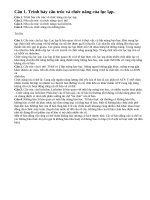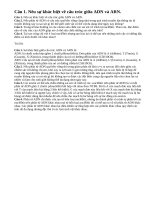CÂU điều KIỆN loại 1, loại 2, loại 3 và đặc biệt
Bạn đang xem bản rút gọn của tài liệu. Xem và tải ngay bản đầy đủ của tài liệu tại đây (284.24 KB, 7 trang )
CÂU ĐIỀU KIỆN
@@@Câu điều kiện loại 0 là câu dùng để diễn tả một sự thật, chân lý, hoặc thói
quen sẽ xảy ra khi điều kiện nói tới xảy ra trước.
Dùng để u cầu, nhờ vả, giúp đỡ hoặc nhắn nhủ một điều gì đó.
Dùng để diễn tả một thói quen, hành động hoặc sự việc xảy ra thường xun
1. If I (wake up) ____ late, I (be) ____ late for work.
2. If my husband (cook) ____, he (burn) ____ the food.
3. If Julie (not/wear) ____ a hat, she (get) ____ sunstroke.
4. If children (not/eat) ____ well, they (not/be) ____ healthy.
5. If you (mix) ____ water and electricity, you (get) ____ a shock.
6. If people (eat) ____ too many sweets, they (get) ____ fat.
7. If you (smoke) ____ , you (get) ____ yellow fingers.
8. If children (play) ____ outside, they (not/get) ____ overweight.
9. If you (heat) ____ ice, it (melt) ____.
10. If I (speak) ____ to John, he (get) ____ annoyed.
11. I (feel) ____ good the next day if I (go) ____ to bed early.
12. Lots of people (come) ____ if Jenny (have) ____ a party.
13. She (buy) ____ expensive clothes if she (go) ____ shopping.
14. My daughter (pass) ____ her exams if she (work) ____ hard.
15. David (be) ____ sick if he (drink) ____ milk.
16. The river (freeze) ____ if it (be) ____ very cold.
17. I (like) ____ to visit the museums if I (be) ____ in a new city.
18. I (cycle) ____ to work if the weather (be) ____ fine.
19. My flatmate (clean) ____ really well if she (clean) ____ the house.
20. Everybody (be) ____ grumpy if it (rain) ____ a lot..
1. wake up/'m
2. cooks/burns
3. doesn't wear/gets
4. don't eat/aren't
5. mix/get
6. eat/get
7. smoke/get
8. play/don't get
9. heat/melts
10. speak/gets
11. feel/go
12. come/has
13. buys/goes
14. passes/works
15. is/drinks
16. freezes/'s
17. like/'m
18. cycle/'s
19. cleans/cleans
20. is/rains
@@@Câu điều kiện loại 1 là câu dùng để dự đốn một hành động, sự việc có thể xảy ra trong tương
lai khi có một điều kiện nhất định xảy ra trước.
If + S + V (s/es), S + will + V (nguyên mẫu)
Dùng để dự đốn hành động, sự việc có thể xảy ra ở hiện tại hoặc tương lai.
Dùng để đề nghị hoặc gợi ý.
Dùng để cảnh báo hoặc đe dọa.
1. If I (to study) ____, I (to pass) ____ the exams.
2. If the sun (to shine) ____, we (to walk) ____ into town.
3. If he (to have) ____ a temperature, he (to see) ____ the doctor.
4. If my friends (to come) ____, I (to be) ____ very happy.
5. If she (to earn) ____ a lot of money, she (to fly) ____ to New York.
6. If we (to travel) ____ to London, we (to visit) ____ the museums.
7. If you (to wear) ____ sandals in the mountains, you (to slip) ____ on the rocks.
8. If Rita (to forget) ____ her homework, the teacher (to give) ____ her a low mark.
9. If they (to go) ____ to the disco, they (to listen) ____ to loud music.
10. If you (to wait) ____ a minute, I (to ask) ____ my parents.
1. If I study , I will pass the exams.
2. If the sun shines , we will walk into town.
3. If he has a temperature, he will see the doctor.
4. If my friends come , I will be very happy.
5. If she earns a lot of money, she will fly to New York.
6. If we travel to London, we will visit the museums.
7. If you wear sandals in the mountains, you will slip on the rocks.
8. If Rita forgets her homework, the teacher will give her a low mark.
9. If they go to the disco, they will listen to loud music.
10. If you wait a minute, I will ask my parents.
@@@Câu điều kiện loại 2 là câu dùng để diễn tả một hành động, sự việc có thể sẽ
khơng xảy ra trong tương lai dựa vào một điều kiện khơng có thật ở hiện tại.
If + S + Ved/V2, S + would/could/should... + V1
Dùng để diễn tả một hành động, sự việc có thể sẽ khơng xảy ra trong tương lai.
Dùng để khuyên bảo, đề nghị hoặc yêu cầu.
1. If I (have) ____ a lot of money, I (buy) ____ a yacht.
2. If I (be) ____ a baby, I (cry) ____ all of the time.
3. If she (eat) ____ lots of chocolate, she (have) ____ bad teeth.
4. If I (not have) ____ a pencil, I (borrow) ____ one.
5. If he (not have to) ____ go to school, he (watch) ____ television all day.
6. If she (have) ____ good grades, she (be) ____ happy.
7. My boss (be) ____ very pleased if I (finish) ____ the job.
8. I (not go) ____ to school if I (have) ____ a bad cold.
9. If she (earn) ____ some money, she (buy) ____ a new dress.
10. If I (invite) ____ fifty friends to my birthday party, my parents (be) ____ mad.
1. had/would buy
2. were/would cry
3. ate/would have
4. didn't have/would borrow
5. didn't have to/would watch
6. had/would be
7. would be/finished
8. wouldn't go/had
9.earned/would buy
10. invited/would be
@@@Câu điều kiện loại 3 là câu dùng để diễn tả một hành động, sự việc đã khơng xảy
ra trong q khứ bởi điều kiện nói tới đã khơng xảy ra.
If + S + had + Vpp/V-ed, S + would/could/might + have + Vpp/V-ed
Diễn tả một hành động, sự việc đã không xảy ra trong quá khứ.
Sử dụng "might" để diễn tả một hành động, sự việc đã có thể xảy ra trong quá khứ những không chắc
chắn.
Sử dụng "could" để diễn tả một hành động, sự việc đủ điều kiện xảy ra trong quá khứ nếu điều kiện nói
tới xảy ra.
1. If the weather (to be) ____ nice, they (to play) ____ football.
2. If we (to go) ____ to a good restaurant, we (to have) ____ a better dinner.
3. If John (to learn) ____ more words, he (to write) ____ a good report.
4. If the boys (to take) ____ the bus to school, they (to arrive) ____ on time.
5. If the teacher (to explain) ____ the homework, I (to do) ____ it.
6. If they (to wait) ____ for another 10 minutes, they (to see) ____ the pop star.
7. If the police (to come) ____ earlier, they (to arrest) ____ the burglar.
8. If you (to buy) ____ fresh green vegetable, your salad (to taste) ____ better.
9. If Alex (to ask) ____ me, I (to email) ____ the documents.
10. If he (to speak) ____ more slowly, Peggy (to understand) ____ him.
1. had been/would have played
2. had gone/would have had
3. had learned/would have written
4. had taken/would have arrived
5. had explained/would have done
6. had waited/would have seen
7. had come/would have arrested
8. had bought/would have tasted
9. had asked/would have emailed
10. had spoken/would have understood
Mixed conditional – Câu điều kiện hỗn hợp
Điều kiện hỗn hợp dùng để nói đến 1 điều kiện ngược với q khứ. Q khứ này tác
động vẫn cịn lưu giữ đến hiện tại nên chúng ta sẽ ước ngược với hiện tại.
Cơng thức: If + S + had + PII, S + would (could/ should/ might) + V + now
1. We (have) ____ enough time if we wanted to see the castle.
2. In case you (buy) ____ a car, will you teach me to drive?
3. She (get) ____ angry if you had told her.
4. If they (support) ____ our product when we asked them, they would get a discount
now.
5. Even if I (ask) ____ him, he won't come.
6. It will be a disaster unless Joyce (help) ____ us.
7. If you (have) ____ something to eat in the morning, you wouldn't feel sick now.
8. I wouldn't risk it if I (be) ____ you.
9. The chicken isn't very good. It (taste) ____ better if you had put some spices on it.
10. I won't go to the dance unless you (join) ____ me.
11. If the hotel in Paris had been full, we somewhere else. (stay)
12. If I got the job, I grateful to you. (be)
13. Unless she (fail) ____ the test she will get her driving licence next week.
1. would have
2. buy
3. would have got
4. had supported
5. ask
6. helps
7. had had
8. were
9. would taste
10. join
11. would have stayed
12. would be
13. fails









